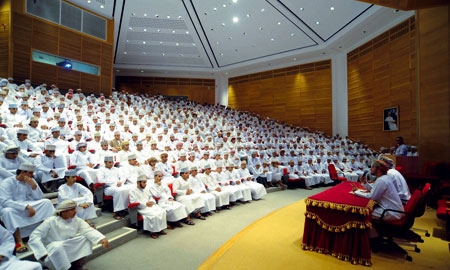Oman is working towards a knowledge and innovation-based society to diversify the economy. Entrepreneurship and higher education have received increased attention in the Gulf state and much emphasis has been placed on the development of small and medium-sized enterprises (SMEs). Institutions such as the Sultan Qaboos University (SQU) and the Information Technology Authority (ITA) are working to hone the skills of young Omanis and encouraging them to establish their own start-ups, particularly in the fields of science, innovation and high technology.
“We have a vision for this university to become an entrepreneurial university. We are concentrating on research at the moment, but we want to turn it into an entrepreneurial university. We are trying to introduce entrepreneurship as much as possible, and that is our greatest challenge,” says Dr Ali bin Saud Al Bimani, Vice-Chancellor of SQU – Oman’s only public university and with around 17,000 students.
The ITA was set up to lead the development of the all-pervading ICT sector in Oman, especially in the areas of e-government, industrial development and capacity building within society. ICT is seen as one sector in which there are many opportunities for start-up companies.
The authority provided training for students and an incubation programme (which is being co-managed by Coventry-based firm UKBI) to encourage innovative thinking within the sphere of high technology.
It also wants to change the mindset of young people who often think it is a much safer and better option to enter a government or large private company, rather than to take the risk of launching their own enterprise.
“Oman is really progressing in the ICT sector. We see the potential for creating small companies and ICTs as a very promising track,” says the CEO of ITA, Dr Salim Al Ruzaiqi. “We would like young people to do something very innovative so we have several initiatives for them.
“For example, one is called The Nest, where we just try to catch all the innovators, people with ideas. They come and sit and have bright ideas and we help them to move their ideas forward and support them financially. We have an incubation facility that can host about 60 companies.”
Of course all of this potential in the ICT sector cannot be realised without the proper infrastructure in place; the country’s telecom operators will be instrumental in this regard. The goals of the ITA are being supported by companies like Nawras, the country’s first privately owned telecom operator and second largest behind government-owned Omantel.
“We are trying to ensure that Oman has the best, most modern telecommunications business-enabling and lifestyle-enabling technology in the world,” says Ross Cormack, former CEO of Nawras.
The British businessman – who recently left his post at Nawras to become CEO of the Myanmar unit of Ooredoo, Nawras’ parent company – says: “I read a study that said for every 10 per cent increase in broadband penetration in the country, it typically generates between 1.4 to 1.6 per cent extra GDP growth. If that is anything like the truth here, we have gone from 30 per cent penetration in the mobile market to 170 per cent today.
“It is people’s ability to do business faster, better and make decisions more quickly and efficiently that makes the economy grow faster. We also play our part in education in the sense that education is management of knowledge and helping students have the right information in the right place.
“Oman has a huge opportunity ahead of it; whether it is knowledge in telecommunication, science or medicine, all of these will flourish in the next few years.”

0 COMMENTS